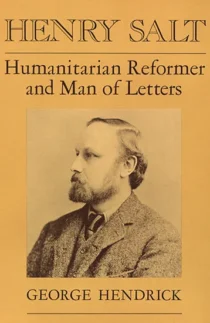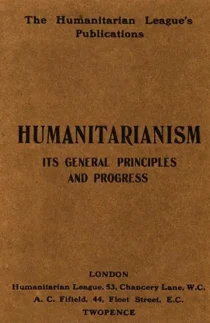
The Creed of Kinship
Henry S. Salt
- Publisher: Constable & Co., London; E. P. Dutton & Co., New York
- Published: 1935
- Length: 115 pages
Summary
The Creed of Kinship is synthesis of Henry Salt’s whole creed as a rebel and reformer, which might be expressed as the gospel of kinship. It is at once a challenge to existing conventional standards, and a defence of heterodox belief. He feels that no partial or one-sided attack upon cruelty, ignorance and superstition is sufficient, but that the true reformer must attack on all sides and harmonise his beliefs into a coherent whole.
Brief, clear overview of humanitarian, based on kinship view of evolved life forms, with consideration of war, poverty, women’s rights, prison reform, theory of punishment, flogging, animal rights, experiments on animals, vegetarianism, hunting, fishing. Shows Salt’s humanitarian vitally concerned with both humans and animals, human rights and animal rights. This vital, wise and courageous book should prove of great interest at the present time, when men’s thoughts are turned towards the criticism of existing institutions.
The book, in fact, is a statement in new form, of the principles of the Humanitarian League. In its last chapter, “One Who Understands,” a personal example is given, from the poet Shelley, of how the faith and conscience of a future age may be partly anticipated.
The dust jacket of the Constable edition features Albrecht Dürer’s famous Young Hare from 1502.
Contents
- Preface
- Kinship a Reality
- Between Man and Man
- Sex Questions
- How Crime Will Cease
- Between Nation and Nation
- When Wars Will Cease
- Two Similar Pastimes
- Between Human and Sub-Human
- Sacerdotalist and Scientist
- Man’s Mistake
- The Sanctity of Life
- Our Relations With Animals
- A Free Religion
- The Sentimentalists
- Sensibility
- Civilisation: A Phase
- One Who Understood
- Index
What the Critics Said
“With a persuasive simplicity fortified by irrefragable logic, Mr. Salt, the octogenarian founder of the Humanitarian Society, expounds his views on social injustice, the treatment of criminals, war, vivisection, diet, and man’s relationship with the lower animals.”—John o’ London’s Weekly
“One of the kindliest men living, Henry S. Salt, put his philosophy on paper. In this quiet, wise book, his is a voice worth listening to.”—Daily Herald
Reviews
- The Essential Unity Of All Reforms The Vegetarian News, 1935
- The Creed of Kinship The Monist, January 1, 1936
- The Creed of Kinship Times Literary Supplement, March 21, 1935
- A Compendium of the Cranks The Observer, September 15, 1935




